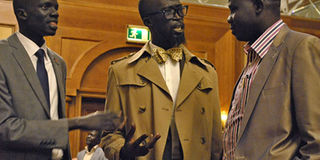US urges Kiir to release political detainees

Members of delegation opposed to South Sudan's government including Grang Demebiar (centre), the son of late Sudanese politician John Garang, attend talks on January 4, 2014 in Addis Ababa, Ethiopia to try and broker a ceasefire between South Sudan's President Salva Kiir led government forces and rebels allied to deposed vice-president, Riak Machar that has claimed thousands of lives in the world's newest democracy. AFP PHOTO/Jacey FORTIN
What you need to know:
- A State Department spokeswoman said at a press briefing Monday that the US does not view the detainees as alleged coup plotters
- A South Sudan government spokesman had said in Addis on Sunday that the detainees would not be released.
The Obama administration has urged the South Sudan government to release allies of former vice president Riek Machar accused of planning to overthrow President Salva Kiir.
A State Department spokeswoman said at a press briefing Monday that the US does not view the detainees as alleged coup plotters but as “political detainees” who should be freed to take part in peace talks underway in Ethiopia.
“We do believe that to be meaningful and productive, senior SPLM members currently detained in Juba need to be present for discussions on political issues which are happening in Addis,” said spokeswoman Marie Harf.
“To help move these talks forward, we urge the government of South Sudan to uphold its commitments and release political detainees immediately,” Ms Harf added.
That stance puts Washington at odds with Juba, which relies heavily on US political and economic support. And by calling for the release of the imprisoned Machar allies, the US has put its weight behind a key demand of the rebels battling Kiir's forces.
A South Sudan government spokesman had said in Addis on Sunday that the detainees would not be released.
““There is no way we can be asked to release people who are arrested and charged,” Information Minister Michael Makuei told reporters. Freeing the detainees would set a “bad precedent,” he declared.




